Spoilers For The Lord Of The Rings Ahead!
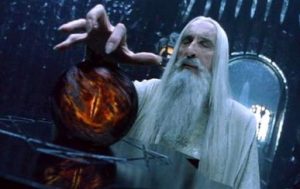
Happy Hobbit Day to all of my readers! Today, we celebrate the shared birthdays of hobbit heroes Frodo and Bilbo Baggins, chief protagonists of the fictional world of Middle-earth (you know, unless you’re counting the heroes of The Silmarillion, like Beren, Tuor, Húrin and Túrin, Lúthien Tinúviel, Eärendil, and so on). And because this is a movie blog, and not a book blog, I will be discussing The Lord Of The Rings movies rather than The Lord of the Rings novels in this post. Typically, I would only consider writing an extensively long post about a movie I disliked, but I have so much to say about these films, and so much of it is good (actually, almost all of it is good).
The Lord Of The Rings: The Two Towers, the second film in the classic trilogy, is currently available to stream on Netflix: here’s my review. I’m not going to be doing my usual hardcore fan-frenzy, where everything I write about the trilogy is unintelligible screaming, sobbing and wailing. Instead, I am going to write about the movie in a clear, concise way – with only a minimal amount of sobbing.
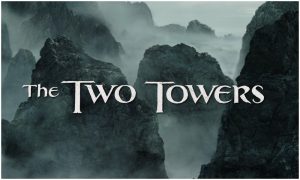
Nonetheless, it would be a mistake to try and downplay the degree to which these films truly are movie-making masterpieces. The Two Towers is probably the most overlooked and underrated installment in the trilogy, but it still boasts more than most movies can: critics almost unanimously praised it for its epic scope and groundbreaking technology, while the Academy Awards rewarded it for special effects and sound editing (it was also nominated in four other categories, including Best Picture). Audiences loved it, making it the highest-grossing film of 2002, and, for a while, one of the highest-grossing films of all time. It was confirmation, if any was needed, that what had begun with The Fellowship Of The Ring a year earlier was not a fluke: the fantasy genre had redefined itself, stepping away from the shackles of sword-and-sorcery, and become a new, unique form of entertainment – critics debated endlessly at the time about whether it classified as “lowbrow” or “middlebrow” (since, obviously, “highbrow” was out of the question) and it would take another year before The Return Of The King won Best Picture at the Academy Awards, cementing the series in cinematic history and establishing the genre as a respected art-form. But unfortunately, The Two Towers has always been stuck in between its two milestone siblings: it was a crucial step in the process, but it tends to get ignored for that reason. What it did achieve, singularly, is just as important: Andy Serkis’ motion-capture performance as the miserable creature Gollum, one of the first of its kind, was a stepping stone in modern CGI techniques – for more on that fascinating discussion, see here. It also led to the creation of the MASSIVE crowd-simulation technique, which is still used to this day on projects such as Avengers: Endgame and Game Of Thrones. These days, director Peter Jackson is a rather more unpredictable commodity, having largely withdrawn from the world of mainstream film-making: he is supposedly still working on a sequel for The Adventures Of Tintin (as of 2016, at any rate), and he’s working on a documentary about the Beatles, but his most recent venture, Mortal Engines, was a discouraging box-office disaster. So it’s worth looking back at the director’s heyday for a glimpse of what Jackson can be at his best, and what he can hopefully be again in the near future.
The Two Towers is a spectacular and daring film, and it’s one of the rare films that can appeal to book-readers and general audiences alike, balancing humor and drama almost perfectly, allowing a vast ensemble cast to shine in ways that shouldn’t be possible – even modern Avengers movies have struggled to balance screentime for their sprawling casts: The Two Towers is a great example of how it can be done well. The intricacy with which subplots and story-threads are woven together, the themes brought to life through Fran Walsh and Philippa Boyens’ script (we’ll talk more about those later), Jackson’s incredible camera-work: not to mention Howard Shore’s phenomenal score – which is used to great effect throughout the film, but most notably in the Fangorn Forest scenes, the arrival of the Elves at Helm’s Deep, and the last march of the Ents. And at the very end, as Samwise Gamgee (Sean Astin) monologues about the stories that really matter, and a world worth fighting for, it’s Shore’s score, a grandiose variant on his iconic “Shire Theme”, even more than the narration and the montage of hope triumphing over despair, that brings me to tears every time I watch Two Towers. This score was not nominated for an Oscar because of a long-standing Academy-rule forbidding sequel scores which reuse old themes: a rule that was rewritten a year later to allow Shore’s Return of the King score to win not one, but two Academy Awards. Shore’s score, the most thematically complex in film history, is a true work of genius: even when Two Towers‘ script fails to fully address the theme, hugely important in Tolkien’s original novels, of the earth itself fighting back against those who would seek to destroy it and harvest it for their own gain, Shore’s “Nature’s Reclamation” theme reinforces this message at critical moments, making sure that we are always subtly aware of it.
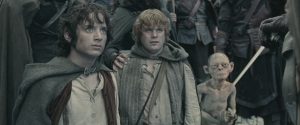
And that’s just behind the scenes talent. In front of the camera, Elijah Wood’s wide-eyed Frodo Baggins is the underrated MVP of Middle-earth, and his Two Towers story arc is pure gold: he and Samwise Gamgee, leaving behind their friends in the Fellowship of the Ring, set out towards the land of Mordor, searching for a way into the impenetrable realm of shadow and ash – but when they come face-to-face with the wretched Gollum, previous owner of Frodo’s Ring, everything changes. Frodo sees in Gollum a twisted reflection of himself, a terrifying vision of the reality which could befall him if he succumbs to the daily temptation of the One Ring. He reaches out to Gollum with small, simple acts of mercy – which includes calling him by his long-forgotten true name, Sméagol. He has to believe he can save Gollum, because he has to believe he can save himself. As a rift grows between Frodo and the suspicious Sam (who is technically right for mistrusting Gollum, but doesn’t realize he’s basically paralyzing Frodo with fear every time he says there’s no way to save the wicked, scheming creature), Gollum is slowly being forced out of his own stolen body by Sméagol, who succeeds in establishing a tentative control over himself for barely a day or two, before Frodo’s “betrayal” under Faramir’s orders causes him to slip: the terror in Sméagol’s eyes when Frodo leads him into a trap, his sudden realization that Gollum is back, and stronger, is absolutely heartbreaking. Frodo and Gollum are both victims and abusers of the Ring’s power, intertwined in a tragic spiral: there is poetry in parallels, such as when a scene at the beginning of Two Towers, where Frodo draws his sword on Gollum to protect Sam, is mirrored by a scene at the end where he threatens to kill Sam to protect his Ring. And it’s up to Wood and Serkis, especially, to sell this storyline, and they do it: Astin is not a perfect Samwise, by any means (his line-delivery, especially, is…questionable in dramatic scenes), but he is also an important member of this loyalty triangle, and he manages to do just enough good in the role to excuse his flaws.
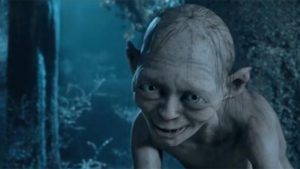
On the other side of the Middle-earth map, the story is largely Aragorn-centric, but Viggo Mortensen’s portrayal of the reluctant warrior-king is at its most subdued here, and he delivers less of the Fellowship smolder, and almost none of the crowd-pleasing Return of the King rallying cries. This isn’t a fault of Mortensen’s performance, he’s still excellent, but it does allow his supporting cast to get some more time to shine – especially, unexpectedly, King Théoden (Bernard Hill) and his counselor, Gríma Wormtongue (Brad Dourif). Somehow, it is these two who stand out the most to me on rewatches of Two Towers, for a variety of reasons: Dourif, for his obvious pleasure in embodying this sickly, conniving character, who appears almost as a parallel to Serkis’ Gollum; the role could so easily have been played melodramatically, with Wormtongue laughing maniacally and expositing his evil plans – but instead, Dourif pulls his punches, letting his physical acting speak for itself. He is pathetic, a coward, and an utterly despicable traitor: but he feels like a legitimate threat at all times, even when he’s knocked down and bleeding. And as for his liege-lord, Théoden, he is a bare husk of a man when we first see him, shrunken in his mighty throne, devoured by age (strengthening his niece Éowyn’s fears that age and immobility will also claim her if she stays at home and rots while the men of her kingdom fight). But when Bernard Hill comes alive, through some CGI wizardry, and takes back his sword, it’s a spark of hope: up until that moment, Two Towers moves slowly, uncertainly, meandering through several subplots with no clear purpose – the moment Hill moves, the film suddenly moves as well, and finds focus. And Hill’s performance continues to be a highlight of the film right up to his desperate charge from the gates of Helm’s Deep. While his character was rather betrayed by the screenwriters in Return of the King, I can hold onto this Théoden as the definitive onscreen version of the noble king. Flawed, displaying a Shakespearean grief, Théoden is a man forced to fight a war that should, in a perfect world, have been fought by his son – who was cruelly stricken down in his youth. Sam’s line later in the film about how “by rights, we shouldn’t even be here” applies to the King as well: he shouldn’t be there, on the front lines, sacrificing his last hard-won years on the earth to defend his kingdom from destruction – but there he is, and he will do anything to keep his people safe.
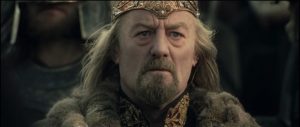
Unfortunately, this is more a testament to Hill’s strength as an actor, and less of a compliment to the script, which tries its best to frame Théoden as a well-intentioned but naive military leader, whose plans to lead his people to safety at Helm’s Deep will ultimately backfire when it leads a caravan of women and children into harm’s way. Thankfully, in this scene, Aragorn is there to save the day and right Théoden’s wrongs.
And that’s a problem that the movie often runs into, trying to pose Aragorn as the answer to all of Middle-earth’s problems, and the sole salvation for the human race. In Tolkien’s novels, this is not the case: yes, Aragorn is in a class of his own, but never to the point where his fellow humans feel like they’re not doing their part to save the world – in the books, Théoden is more than willing to ride out to war, and doesn’t waste time worrying about petty grievances Gondor may or may not have caused in the far-distant past; and in the books, Faramir, here played by David Wenham, is completely different from how we see him onscreen. In Jackson’s version of events, an antagonist is needed to disrupt Frodo, Sam and Gollum’s story from its forward motion, and that antagonist is Faramir: who, in Tolkien’s version, is a quiet, mild-mannered pacifist who is not only a trustworthy ally but a good friend. Here, Wenham (who had never read the books before taking on the role) does his level best to make Faramir unsympathetic and unrelenting, threatening the hobbits on multiple occasions, dragging them as prisoners toward his even more tyrannical father, and nearly falling victim to the Ring. In the film’s Extended Edition, a great deal of Tolkien-derived backstory is glimpsed for Faramir, including his desire to have his father notice him and recognize his great deeds: sadly, we see none of that in the theatrical edition, which is the one I’m reviewing here. Instead, what we get is a low-key villain who appears to maybe be conflicted about what he’s doing, but does it nonetheless. This is one of the biggest crimes of The Two Towers, especially since Faramir, on the page, was the character who most closely embodied all of Tolkien’s own beliefs and philosophies, and whose “sea-green incorruptible nature”, as Philippa Boyens once put it, was supposed to serve as a reason for readers to place their hopes in the faith of Men. But no, we’ve got Aragorn to do that – you know, the guy who, according to Jackson, doesn’t even like being a human and wishes he were one of the Elven-folk (for the record, that change to Aragorn’s character is interesting, but it only increases the need for Faramir to be good).

Anyway, while there is some justification for the butchering of Faramir, there isn’t any for the drastic alterations to the character of Treebeard (voiced by John Rhys-Davies): one of the giant, mysterious Ents who inhabit Fangorn Forest, Treebeard is the shepherd of the trees, a sorrowing remnant of an ancient world, one who remembers the splendor of the forests of old and is watching as his last corner of the world shrinks under the axes of orcs and the mechanisms of the White Wizard Saruman (Christopher Lee). But in the movies, Treebeard is somehow unaware of Saruman’s evil, despite living a few miles from him, and has to be tricked by Pippin Took (Billy Boyd) into seeing the horrors of war firsthand. This one bothers me far more than Faramir, honestly, because (a) it’s completely unnecessary, and (b) having Pippin be the one to outsmart Treebeard only makes the forest-giant look even more stupid, considering that Pippin is not known as the brightest member of the Fellowship. This was justified as a way for Merry and Pippin to have some say in events, but again, it could have been avoided: in the books, Merry and Pippin are the deciding factor in Treebeard’s plans to go to war, reminding him that there are good people in the world outside his forest who still love nature, people who are worth fighting and dying for. Reducing that motivation to a cheap trick robs the story of its emotional impact, and misses an opportunity to reinforce the film’s themes.

There is another missed opportunity in Two Towers that baffles me to no end: while Aragorn and his friends are preparing for battle at Helm’s Deep and Frodo and Sam are captives of Faramir, another subplot is introduced, one that initially appears to fit in with the rest of the story – this being the tale of Aragorn and Arwen (Liv Tyler). Arwen first begins appearing through flashbacks and an unconscious dream-sequence, and the audience has to piece together certain events that are…well, vague, to say the least. Arwen’s choice to give up her mortality so she could be with Aragorn should have been that simple, but Jackson chooses to elaborate upon the framework of their romance that Tolkien built – and his attempts to do so get pretty derailed. For some inexplicable reason, it is implied that Arwen’s immortality is bound up with the Evenstar pendant that she gave to Aragorn in Fellowship, but the flashbacks here suggest that, only a short while after she gifted it to him, Aragorn tried to return it to her, telling her that they could never be together, and that he wouldn’t have her die on his account. But he ended up keeping it, because she told him “it was a gift”, and now he starts possibly falling for his temporary traveling companion, Éowyn (Miranda Otto), who definitely has feelings for him: and then he loses the Evenstar, but then he gets it back, and when he does I guess that symbolically renews his love for Arwen – but off in Rivendell, Arwen is teary-eyed and depressed because Elrond (Hugo Weaving) tells her that even if Aragorn does win the war against Sauron, he is still a mortal, and will die eventually. His speech is accompanied by an absolutely beautiful vision pulled straight from the Appendices of the novel, in which a veiled Arwen mourns at Aragorn’s tomb before abandoning the waking world and departing into the forest, never to be seen again. It’s touching stuff, and Arwen is eventually convinced to go away with the rest of Elrond’s people to the Grey Havens, to set sail into the West and preserve her immortality. Except…she already gave that up, didn’t she? What exactly are the mechanics of giving up your immortality? Isn’t that what the pendant is all about? We don’t get to find out in Two Towers, because for whatever reason Jackson chooses to leave that subplot hanging, until it can finally be resolved in the third film. Then, and only then, do we learn that Arwen doesn’t go to the Grey Havens, but has a vision of her own future with Aragorn, and the family they will raise together – a vision which inspires her to turn around, march back to Rivendell, and angrily confront her father with the truth: instead of fleeing, they have to help Middle-earth. They have to reforge The Blade That Was Broken. That would have been an excellent ending for her storyline in Two Towers, and would have been entirely consistent with the film’s themes – but Jackson, once again proving he had no idea what to do with Arwen, chooses to break up the story between the two films. A little cohesion can go a long way, and Arwen’s entire subplot lacks any.
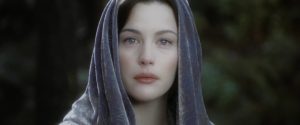
I could go on and on, nitpicking every little alteration to the story and every single detail that breaks with book-canon: Samwise shouldn’t throw precious lembas bread to Frodo while they’re sitting a few feet away from a cliff; even if the old alliances did hold, Rohan wouldn’t be able to send word to Gondor and receive an army of reinforcements within a few hours, as Aragorn suggested; Legolas (Orlando Bloom) mistakenly refers to the Uruk-Hai heading north-east toward Isengard – that one’s especially funny, considering that later in the same movie, excessive screentime is devoted to studying a map of Middle-earth which proves him completely wrong. But talking about these minuscule nuisances would be petty, in the bigger conversation about The Two Towers and what it’s attempting to say.
It’s a story about hope – about finding something to believe in, and to hold onto, even when all around you seems to crumble into ruin. It’s a story about a disunited world coming together to face unspeakable evil, about people realizing that we are all in this life together, and that it’s our duty to defend those who need our help – and that’s why I can’t, for instance, be too mad about the Elves coming to Helm’s Deep to fight alongside the Men of Rohan: because, while it might not be in the books, it still achieves what Tolkien wanted to say, about how we are the stewards of our earth, and, when in dire circumstances, we will stand side-by-side to protect it. In this modern age, a story like that is more essential than ever.
Or, as Samwise Gamgee would put it, it’s a story that really matters.
Movie Rating: 10/10